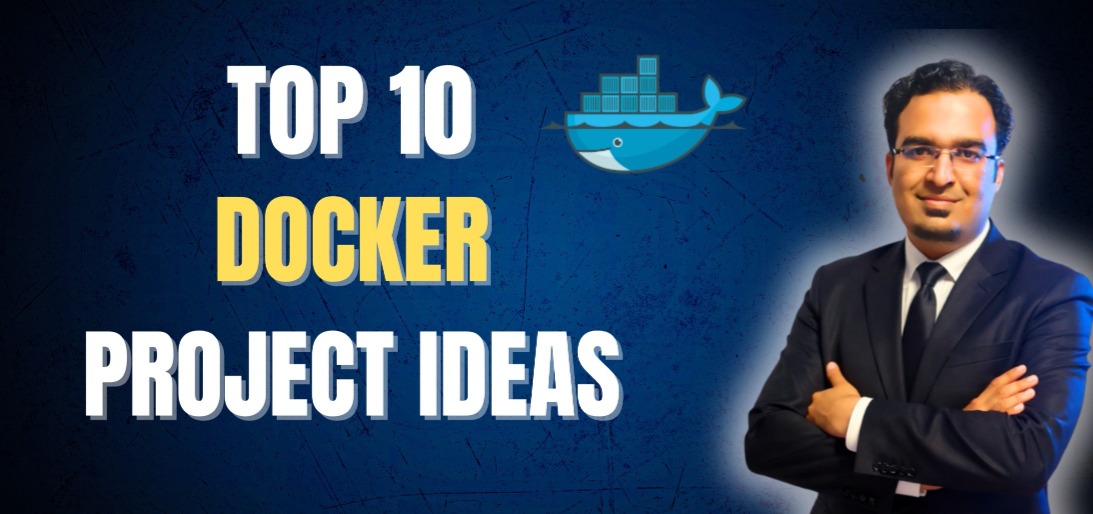There are no items in your cart
Add More
Add More
| Item Details | Price | ||
|---|---|---|---|

Docker has become one of the most essential tools for developers, DevOps engineers, and cloud professionals. It allows you to package applications into lightweight containers that run consistently across different environments.
If you’re a beginner learning Docker, the best way to gain confidence is by working on hands-on projects. In this blog, we’ll explore the Top 10 Docker project ideas for beginners that will help you build real-world skills and boost your DevOps career.
1. Build a Personal Portfolio Website with Docker
This project involves creating a personal portfolio website using static files like HTML, CSS, and JavaScript. Docker will be used to containerize the application, making it easier to deploy and run on any system. It’s a great way to learn the basics of Docker and showcase your portfolio in a professional environment.
Technology Stack: HTML, CSS, JavaScript, NGINX
Complexity Level: Beginner
Estimated Duration: 30 minutes
Learning Outcomes:
2. Run a Basic Web Server with Nginx in Docker
This project involves creating a Docker container that runs a basic web server using Nginx. Nginx is one of the most popular open-source web servers for reverse proxying, load balancing, and serving static content. By the end of this project, you will have learned how to create and run containers with Docker and expose ports so the application can be accessed from your local machine.
Technology Stack: Docker, Nginx
Complexity Level: Beginner
Estimated Duration: 30 minutes
Learning Outcomes:
3. Static Website Deployment with Docker
This project involves deploying a static website using Docker. You can build a simple site with HTML, CSS, and JavaScript, then use Docker to package and serve it through a lightweight web server like Nginx. This project helps beginners understand how Docker can simplify deployment and ensure consistency across different environments.
Technology Stack: HTML, CSS, JavaScript, Nginx, Docker
Complexity Level: Beginner
Estimated Duration: 1 hours
Learning Outcomes:
In this project, you will build a simple to-do list app with and Node js for backend MongoDB as the database. Using Docker Compose, you’ll set up and manage multiple containers, enabling seamless communication between the application and the database. This project introduces the concept of multi-container setups in a beginner-friendly way.
Technology Stack: Node.js, MongoDB, Docker Compose
Complexity Level: Beginner
Estimated Duration: 1–2 hours
Learning Outcomes:
Deployment Options: Local or any cloud hosting provider.
5. Simple Weather App in a Container
This project focuses on building a weather application that retrieves data from the OpenWeatherMap API. With a Python flask backend and a lightweight React.js frontend, you’ll learn how to containerize both components and enable them to communicate via Docker networking. It’s a fantastic way to practice API integrations and Docker basics.
Technology Stack: Python (Flask), React.js, OpenWeatherMap API
Complexity Level: Beginner to Intermediate
Estimated Duration: 1– 2 hours
Learning Outcomes:
6. Set Up a Dockerized WordPress Website
Deploying a WordPress website with Docker involves setting up a multi-container environment with WordPress as the frontend and MySQL as the backend. This project teaches you how to use Docker Compose to manage linked containers, offering a hands-on experience with deploying dynamic websites.
Technology Stack: WordPress, MySQL, Docker Compose
Complexity Level: Beginner
Estimated Duration: 1–2 hours
Learning Outcomes:
7. Create a Python API and Deploy with Docker
In this project, you will build a RESTful API using Python’s FastAPI framework and then containerize it with Docker. It’s a simple yet effective way to learn how to create APIs, manage dependencies, and bind container ports for API access. This project highlights how Docker simplifies API deployment.
Technology Stack: Python (FastAPI), Docker
Complexity Level: Beginner
Estimated Duration: 2 hours
Learning Outcomes:
8. Building a Simple Multi-Container Application
This project will help you get familiar with Docker Compose by building a multi-container application. You’ll create a simple web application using Flask as the frontend and MySQL as the backend database. Docker Compose allows you to manage multiple containers that work together.
Technology Stack: Docker, Docker Compose, Flask, MySQL
Complexity Level: Beginner
Estimated Duration: 2–3 hours
Learning Outcomes:
9. Develop a Dockerized CI/CD Pipeline
Set up a Continuous Integration/Continuous Deployment (CI/CD) pipeline using Docker containers. This project teaches you how to automate application builds, testing, and deployment processes, integrating Docker with CI/CD tools.
Technology Stack: Jenkins, Docker
Complexity Level: Intermediate
Estimated Duration: 2–3 hours
Learning Outcomes:
This project involves building and containerizing a simple e-commerce application. You can create a backend using Node.js or Python Flask, connect it to a database like MySQL or MongoDB, and build a frontend using React or Angular. Docker will be used to containerize each component, and Docker Compose will help manage the multi-container setup. This project provides a practical example of how modern web applications are deployed in real-world scenarios.
Technology Stack: Docker, Docker Compose, Node.js/Flask, React/Angular, MySQL/MongoDB
Complexity Level: Intermediate
Estimated Duration: 3 hours
Learning Outcomes:
Conclusion
In conclusion, Docker is a transformative tool that simplifies application deployment, making it essential for modern development and DevOps workflows.
By working on these Docker project ideas, you not only deepen your understanding of containerization but also build a portfolio that demonstrates your ability to solve real-world problems.
Whether you’re starting small with a personal portfolio site or exploring more advanced setups like CI/CD pipelines, these projects provide the perfect launchpad for your Docker journey.
Wed Aug 20, 2025
"DevOps is not a product, it's a culture " - Damon Edwards
Ayushman Sen is a DevOps Engineer at CloudDevOpsHub with a passion for cloud technologies and automation. He enjoys writing blogs to share his DevOps knowledge and insights with the community. A true DevOps enthusiast, Ayushman is also passionate about traveling, listening to music, and playing musical instruments.

Ayushman Sen
DevOps Engineer at CloudDevOpsHub